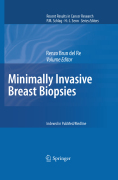
Modern imaging methods have made it possible to detect breast cancer at an earlier stage than in the past. Nevertheless, a large majority of suspicious findings at screening subsequently prove to be benign. It is therefore important to be able to identify benign lesions in a manner that is reliable, tissue sparing, patient friendly, and cost-effective. More than 70% of breast biopsies can now be performed using minimally invasive procedures that meet these criteria. This book examines in detail vacuum-assisted minimally invasive breast biopsy systems (ATEC, EnCor, Intact, Mammotome and Vacora), stereotactic systems,MRI-guided procedures, and ductoscopy. Further chapters are devoted to the pathology of the breast tissue obtained using these procedures, their limitations, the implications of recent advances in breast imaging, and the results of cost-benefit analyses. The closing chapter provides a systematic review and meta-analysis of recent data. INDICE: Documentation and correlation of senologic findings. Comparison oflarge core vacuum-assisted breast biopsy and excision systems. Sonographically guided vacuum-assisted breast biopsy using handheld mammotome®. The Vacora® Biopsy System. Stereotactic systems available for breast biopsy. MRI-guided minimally invasive breast procedures. Ductoscopy of intraductal neoplasia of thebreast. Pathology of breast tissue obtained in minimally invasive biopsy procedures. Limitations of minimally invasive breast biopsy. Advances in breast imaging: Dilemma or progress? Cost-benefit analyses. Systematic review and meta-analysis of recent data.
- ISBN: 978-3-540-31403-5
- Editorial: Springer
- Encuadernacion: Cartoné
- Páginas: 250
- Fecha Publicación: 23/07/2009
- Nº Volúmenes: 1
- Idioma: Inglés
